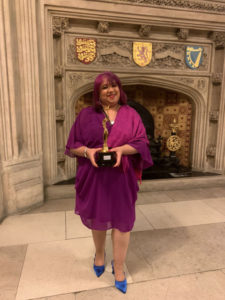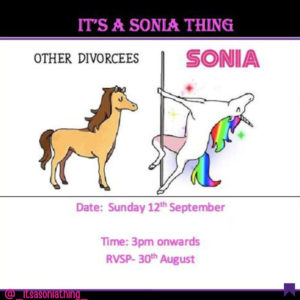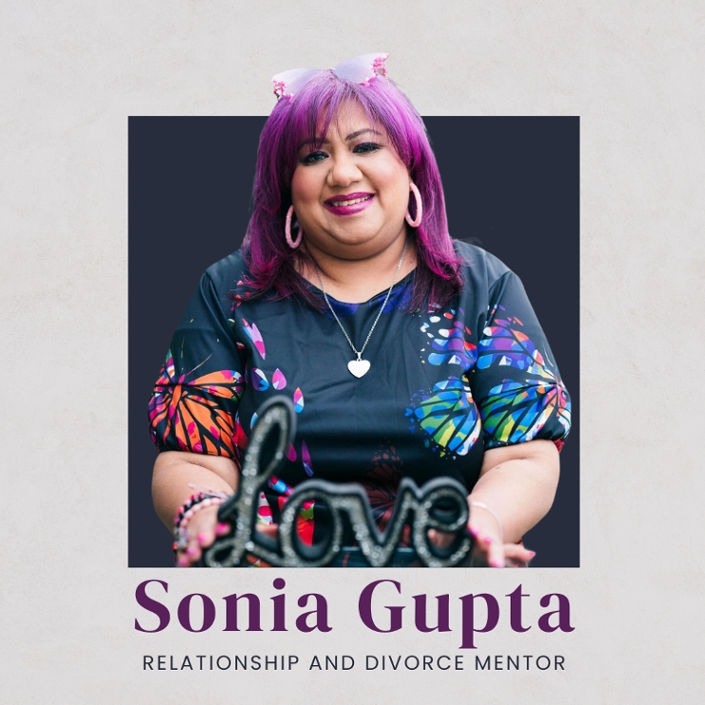CATEGORIES
Breaking Stereotypes | People We Admire | Social ImpactOverview:
- Sonia Gupta discusses the stigma of divorce in South Asian culture to rediscover self-worth and independence.
- Her ‘Divorce Party’ evolved into a movement, inspiring countless others.
- Sonia continues to empower and support others around her by being a relationship mentor.
1. How do you think the cultural expectations of your childhood shape your perspective on relationships and life choices?
After quite a bit of self-reflection, I realized that I didn’t marry because I wanted to. I thought it was what I wanted, but part of it was simply the norm in Asian culture. Right from when you’re born, the most important thing in life is to get married and have children. I think, when a certain concept is imposed on you throughout your life, you grow up thinking that is the right thing to do. Getting married becomes the most important milestone you need to achieve to live a fulfilling life. Nothing else, not even your career is as important. Everything else becomes simply what you do apart from marriage and children.
And once you do get married, you realize this isn’t what was promised to you. There are so many people who are unhappy with their relationship choices and are separating. Sadly on social media platforms, every other post is, ‘I’m really unhappy in my marriage. I want to divorce. I want to separate, how do I do it?’ Some of the stories are quite shocking and that there are so many people in awful situations. So it’s becoming apparent that in this era, we’re going to see, unfortunately, many relationships fall apart because people are unhappy with their marriages, which in many cases wasn’t their “choice”.
I’ve heard many people say that these failed marriages occur because people these days aren’t patient or tolerant enough but think it’s solely because they are more empowered to make the right choices and walk away from a relationship that no longer serves them. For example, I think my children are going to make better choices than the ones we made. This is because we have parented them differently. We have changed our views on what a healthy relationship looks like and what to do when it’s not serving us.

2. In South Asian societies, divorce is often stigmatized, particularly for women. How did you deal with the cultural and familial pressures during your divorce, and what advice would you give to others facing similar challenges?
Honestly, convincing my parents I needed the divorce was my biggest battle. I remember telling my parents about my failing marriage. And all they told me was to “Make it work.” Looking back, I don’t think they told me that because they thought I could actually make the marriage last. To them, raising two kids in a volatile environment seemed better than a single mother raising two kids alone. What they and many people fail to understand is that you can still co-parent and bring your children up side by side. You don’t have to be raising them alone.
I don’t think anyone understands the impact the volatility of an unhappy household has on children. That was one of the major reasons I kept fighting for my divorce. Because of how miserable my partner and I were, we could not be good parents. I knew my children deserved better. So I persevered. I persevered and battled my own parents and my ex-husband for a period of 8 years before I actually filed for divorce. I didn’t realize I had it in me to keep going for so many years. But I knew I was fighting for the right thing.
Being financially independent was also important in contributing to my self worth and confidence. In some cases, where the separation is mutual and amiable, you might be able to sustain yourself with what your ex-partner provides for you. But I believe that’s still an element of control, because what if they decide to stop? What then? You have to be able to support yourself even if your partner can provide for you. This is the reason I emphasise on financial independence if you decide to separate from your partner, especially as a woman.
3. You have been known for your “Divorce Party”, could you walk us through how you came up with this idea? Additionally, what kind of response did you receive for it?
Let’s start at the beginning! I didn’t plan to have a divorce party initially. It was just a backyard party with a few of my close friends. My children and I had planned it multiple times but the dates never worked out. Then, during the COVID restrictions, the limit of 30 people made it impossible for me, as a social person, to invite all my favorite people. So, the plan was shelved for a while.
Months later, at the end of August my oldest child and I came up with the idea of having the party the following month. The theme was obviously pink! What was initially meant to be just a gathering of a few close friends and a DJ spiralled into a full-blown celebration. We had a unicorn bouncy castle, a unicorn cake, a mobile cocktail bar, a DJ, a pink marquee,a pink carpet and bright balloons to match everything. I can’t put into words how much I enjoyed myself at the party. It was me, my children and my friends—all gathered together in a space filled with laughter.
I realized that the reason we enjoyed it so much was because for so many years, our house just wasn’t ‘our home’. My sons, now 20 and 13 years old, missed out on a lot of their play dates because we could never invite children to an environment that wasn’t welcoming. Before my marriage, my house used to be the hangout spot for all my friends. After marriage, our house became a place where we just ‘survived’. This party wasn’t just a celebration; it was a reclamation of the old me—the person I was before marriage.
What I didn’t anticipate was what happened next. One of my friends, who runs a network in the UK called Asian Single Parents, posted pictures from the party. Then, a reporter got in touch with me and published an article online. The Mirror, a newspaper in the UK, picked it up and then the story went viral! My nieces and nephews from India told me “You’re trending on social media.” and I didn’t know what to make of it.
It was overwhelming. Headlines like “Indian Woman Throws Divorce Party” were everywhere. My parents, who were already upset about my divorce, were shocked to see me openly celebrating it. Their reaction was expected because divorce is still a taboo topic in Indian culture, and now I was sharing my story with the world.
I didn’t expect the party to gain so much attention, let alone become a turning point in my life. Messages started pouring in, especially from India, with people telling me how my story inspired them. What felt like a simple, personal celebration turned into something much bigger.
4. What were the most valuable lessons you learned during your transition from a challenging marriage to becoming a mentor, and how do these lessons inform your guidance to others navigating similar paths?
Only you know what you’re going through. Only you know your struggles so don’t let anyone dictate right and wrong for you. Divorce was the right thing to do for me. But you will never catch me saying divorce is easy. In fact, it’s a really hard decision to make. I’m never going to say divorce is always the right thing, for some people it simply isn’t.
In my experience working with couples, the challenges they face stem from communication breakdowns, differing love languages, or issues that can often be resolved with effort and understanding. As a mentor and coach, I’ve helped a number of couples save their marriage. But if you feel your marriage is truly over, you have to get back on your feet, regain your self worth and self respect, and be financially independent.
For 12 years, as I dealt with the difficulties of leaving my marriage, I felt utterly alone. I didn’t know anyone else in a similar situation. From the outside, everyone seemed happy. You never truly know someone’s struggles until you share your own—and that’s what I discovered. By opening up, I connected with countless others who resonated with my journey.

5. You look at divorce as a pathway to empowerment. How do you help clients reframe their perspectives in the face of backlash from the community, and see it as an opportunity for growth?
One of the most important things you can do to regain your self worth is to find your tribe. Find a group of people who can relate to your story and can support you. I did not know there were networks for single parents in the UK. After my divorce I met many people through similar support groups and I realized I wasn’t alone in this journey.
Society also needs to understand that getting a divorce is a really hard choice to make. No one gets married to someone thinking they will eventually separate. People marry each other thinking this would last forever. Which is why I think making the decision to divorce is harder than deciding to marry someone. You have to be strong to go through with it.
Another advice I would give is to not listen to what everyone around is telling you. If you are unsure of your decision, get professional advice. Family and friends will always be emotionally involved. You have to make your own decisions, people will always talk. If you’re not married, they’ll ask you why you aren’t. If you are married they’ll ask you when you are having kids. If you’re divorced they’ll assume you’re the one at fault. People will always have something or the other to say. In my case, I’m the divorced woman with pink hair! I don’t care what people think anymore. That got me to where I am now. So, I’d say the best thing to do is to own your journey. The more empowered and informed you are in what you’re doing is right, the better you’ll be when you come out on the other side of your decision.
Lastly, it is important that my clients explore every opportunity to heal and restore a marriage before considering separation. As a mentor, my priority is to help them reconnect with their partners, addressing underlying issues if there’s a chance the relationship can be saved. Separation should only be considered when every effort to reconcile has been exhausted.
6. Do you think South Asian societies have become more accommodating to the idea of divorce? If yes, how? If not, what do you think is holding our communities back?
One of the major reasons why people don’t go ahead with divorces is because of societal ostracization of divorced people. People gossip about you, you’re not invited to weddings or family functions. The situation is worse for women. You are judged—they think you had an affair or you must be doing something wrong or you’re selfish. I think the fear of being ostracized plays a vital role in keeping women bound to unhappy marriages and relationships. Women are also worried about life after the divorce. Like I mentioned before, in most cases, women aren’t financially independent. They have to depend on their spouse or family for money. This restricts a woman’s ability to make informed decisions because she is bound by her financial situation.
It’s difficult for South Asian communities to understand that a woman’s worth and happiness have value. We are fed this idea that women are supposed to be selfless—that they sacrifice their well being and time for the happiness of everyone around them. When you’re unmarried, you’re the ideal daughter who places her parents’ happiness above everything else. When you’re married, your husband and children are your first priority. You do not matter. You only exist as a wife, mother or daughter-in-law. You’re not allowed to be Sonia. You’re not allowed to have hope, ambition or happiness. You only live for your husband, your children, your in-laws, parents—basically everyone else but yourself.
The moment you say, “I’m living for myself and not anyone else”, people will ask “What’s she doing? Why is she doing that? She doesn’t love her children. She’s being selfish.” I think it’s wrong to label someone who’s choosing to divorce as selfish. On the contrary, it’s actually essential to do this because you decide to value yourself. You’re only giving yourself some self-respect leaving a relationship where you weren’t able to thrive.
7. What helped you gain your self worth and find yourself in this tedious process? Apart from acceptance, what helps aid the process?
The first step for me was realizing the fact that I was deeply unhappy in this marriage. I was simply surviving in the marriage where I was just doing these monotonous tasks day after day. I did not realize my grief was that obvious until one of my childhood friends pointed it out. After I was divorced she said, “I remember seeing you at my wedding, but you weren’t there.” She mentioned that I didn’t look happy and I hadn’t danced, which was very unlike me. That conversation put some things into perspective for me. Back then, although I was deeply unhappy, I hadn’t accepted that my marriage was over. I was trying to make it work.
Once you have accepted the fact that your marriage is over, you have already overcome the hardest step in the process. After moving away from the relationship, you have to ask yourself— ‘What was I like before this relationship? What were my likes and dislikes before? What made me smile? What made me feel like myself?’ As a coach, I’ve observed that most women in relationships lose part of themselves in it. They give up their jobs. I’ve heard women say they live for their husbands, their children, their parents. And I ask them “Where are you?”
Until you put yourself first, until you look after yourself, you cannot help anybody else. You end up losing your self-worth over the years. You end up in the bottom of the pile because you are told to put everyone else before yourself. So once you start putting yourself first, and that could begin with something as simple as getting your nails done or getting a new hair cut—anything that helps rebuild your confidence. Taking those small steps every now and then will ensure that you ultimately regain your confidence.

8. What is something that you enjoy outside work?
I wouldn’t say I have a specific hobby, but I thrive on being social. I love going out, meeting new people, and making connections. It’s not a traditional hobby, but it’s fulfilling for me. Dancing and music, especially Bhangra, are also a big part of my life. In fact, I’m about to drive a couple of hours to a Bhangra gig in the UK!
I swim occasionally when I feel like it, but I wouldn’t call it a routine. What truly excites me is networking and getting to know people from different walks of life. For many years, I couldn’t do that openly—I felt confined in some ways. Now, I think I’m overcompensating.
Between my full-time job in operations and business development and being a mentor, life is pretty packed, but I find joy in these social experiences.
9. What are your favorite books or quotes?
To be honest, I’m not much of a reader. I’ve never really had a book that I turn to or reread, though maybe I should explore that. But, I’ve written a book, and I’m excited about its release, hopefully next year.
As for a quote that defines me, I’d say: Own your journey. That mindset has carried me through everything in life. It’s about taking full ownership of your story, your decisions, and your path, regardless of how others see it.
For 8 years, I battled my parents because I desperately wanted them to understand why I needed the divorce. I wanted their approval.
I realized I had to make my own decisions and I couldn’t wait anymore for their permission. Eventually they did come round and support me but it was a long battle, one that still hurts when I look back.
So that’s my message to everyone: Own your story. Own your journey. You need to do so in order to thrive and not just survive.
Conclusion:
For Sonia, life after adversity is filled with lessons and gratitude, and it’s a chance to lead with resilience and joy. She hopes to inspire others to embrace their unique paths, celebrate their victories, and thrive unapologetically.


